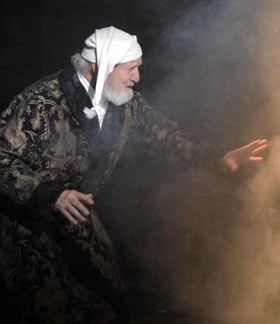Interview: Eric Rosen of A CHRISTMAS CAROL at Kansas City Repertory Theatre


Beginning this Friday night, November 17, and continuing through December 24, Ebenezer Scrooge, Jacob Marley, and the famous three spirits of Christmas re-inhabit the Spencer Theatre with a new adaptation of Charles Dickens "A Christmas Carol" by Kansas City Repertory Theatre Artistic Director Eric Rosen.
One hundred seventy-five years have raced by since Charles Dickens first imagined the story and scribbled it down with quill over six frenzied weeks in the late fall of 1843. "Christmas Carol" began life as a five chapter novella."
From the original press run of 6000, Dickens received very little money because he insisted each copy come with four hand-done full color illustrations in excellent bindings. Critics and readers alike loved the story. Staged versions of the tale (for which Dickens received no compensation) appeared almost immediately.
Broadway World spoke with KCRep Artistic Director and Production Director Eric Rosen about his entirely new adaptation of the classic work. It may be too late to compensate Charles Dickens, but never too late to honor the text. This is the 37th year in a row that KC Rep has offered some version of "A Christmas Carol"
BWW: How did the Christmas Carol project begin for you?
Eric Rosen: Every year I would compare scripts, I never saw one that I liked better than ours, but there was something about the Dickens original text that I had not seen satisfactorily represented.
BWW: When did you finally decide a new version was needed?
Eric Rosen: A year and a half ago, I decided I would create an entirely new adaptation. I was originally trained to do adaptations before I ever wrote a play. All my education is in that. And this is not really playwriting this is a completion of what Dickens intended.
BWW: What questions were you attempting to answer?
Eric Rosen: I wanted to explore how do you go from this theater of the mind (in the original text) to what can you reveal through the public nature of theater? How do you go from one person's (reading) imagination to 550 peoples' imaginations? How do we translate a reader experience into an exciting dramatic experience?
There has always been something (in adaptations) that misses the authentic, the very funny, and the surreal quality. It is there in the text that Dickens wrote. I've tried to capture as much of Dickens language as I could. As a result, the version that I've written is really conservative in terms of I don't readily depart from what Dickens' wrote... ever.
BWW: What else strikes you as most often ignored in typical adaptations?
Eric Rosen: When he (Dickens) describes things I try to represent them in an interesting way. There are questions raised in the original text that are not often represented. For example, the first time Scrooge sees himself with the first spirit, he sees himself reading the Arabian nights and Robinson Crusoe. Scrooge says he is just a young boy who is reading and imagining. And what he is doing... he is reading and imagining Ali Baba.
His younger self says 'Yes, Of course it was the first time I was alone and Ali Baba did come. We see Scrooge as a child with an extraordinary imagination. You can't distinguish between what he is reading in the text and what he is imagining. Getting to know the real Scrooge is one of the questions that I am trying to answer with my new adaptation.
BWW: What other differences from the Dickens' text strike you as being important?
Eric Rosen: Marley tells Scrooge that these visits are going to happen on three separate days and at three separate times but in actuality it is about a man that goes to sleep one night, wakes up the next morning. How many times are dreams spoken of in the literature and what is the origin and the end point of that character's life. It is a detail that gets left out most often.
This is a chance to re-examine, reimagine, and remake a piece of art. I'm finding Dickens original text much funnier and joyful than I had remembered. I'm fairly certain that this discovery will also be shared by our audiences.
Tickets for "A Christmas Carol" are available at the Kansas City Repertory Theatre website www.kcrep.org, in person at the box office, or by telephone at 816-235-2700.
Eric Rosen Photo courtesy of Kansas City Repertory Theatre
Production Photo courtesy of Kansas City Repertory Theatre and Cory Weaver
Comments
Videos

